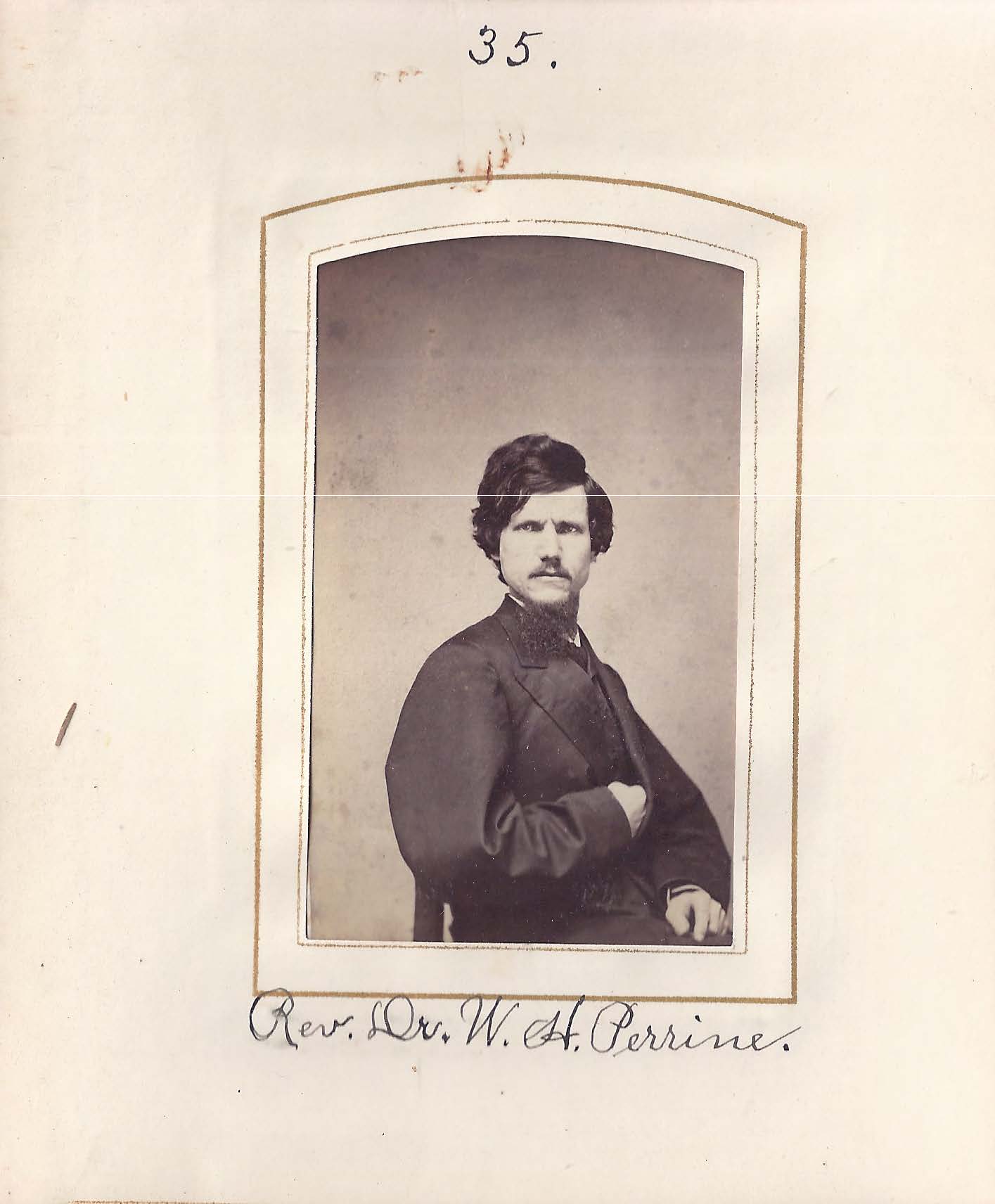William H. Perrine

8 October 1827 - 22 January 1881
William H. Perrine
In the prime of a noble manhood, in the midst of far-reaching plans for future usefulness, in the very meridian of his intellectual power, with the gospel trumpet to his lips, our beloved, honored, and lamented brother, Dr. W.H. Perrine, was summoned home to die. He fell like a warrior at his post of duty, with his armor on, his hand grasping the sword of spirit.
He died at his residence in Albion, Mich., Jan. 22, 1881, in the fifty-third year of his age, of pleuro-pneumonia, after an illness of one week.
Dr. Perrine was born at Lyons, N.Y., Oct. 8, 1827, and moved with his parents to Michigan in 1833. The Perrine family of which he was a descendant were Huguenots who fled to this country from the religious persecutions of their native land.
He was converted and joined the Methodist Episcopal Church at the age of thirteen. Almost immediately he felt that God had called him to the ministry, and to prepare for this work he at once bent all his energies. He had a strong proclivity towards artistic studies, and it cost him a severe struggle to relinquish those earlier aspirations. Indeed, he never did relinquish them fully. As he became older he learned that there was no antagonism between Christianity and true art, and so he became minister and artist both.
At fourteen he became involved in doubt - not an unusual experience for a thoughtful and inquiring mind. It was six years before he attained satisfactory evidence of his acceptance, but when the light did come, it came to stay.
He graduated from Spring Arbor - afterwards Hillsdale College - in 1853, and in 1854 was married to Miss Livonia Benedict. He entered the ministry in 1851. His early ministry was in the demonstration of the Spirit and of power.
He carefully prepared his sermons and then made them glow with the enthusiasm of his own soul. Had he confined his great powers to this department of work, he would have had few peers as a pulpit orator. The fact that he filled the best pulpits of our State, to the delight of large audiences, leading many souls to Christ, is the best evidence of his acceptability as a minister of the gospel. Yet it was only on great occasions, when conditions were favorable, that he rose to the full height of his commanding oratory.
The following is a list of his appointments in their order: South Albion, 1851; Jackson, 1852; Lafayette Street, Detroit, 1854-5; Adrian, 1856-7. In 1858 he took a trip to Palestine. In 1859 he was stationed at Ann Arbor. In 1860-61 he took a superannuated relation, and in 1862-3 he was appointed to Flint. From 1864 to 1867 inclusive he occupied a position as a professor in Albion College; in 1868-9 he made a second trip to Palestine. In 1870 he was appointed to Lansing District, and in 1871 he was again called to a professorship in Albion College, which position he held until 1873. His subsequent appointments were: 1874, St. Joseph; 1875-7, Albion; 1878, Marengo; 1879, Parma; 1880, Concord.
In 1871 the degree of Doctor of Divinity was conferred upon him by Albion College. In educational matters Dr. Perrine was widely known. The fact that he filled acceptably at different times the chairs of Natural Science, History, Belles Letters, and Art in Albion College, proves the versatility of his talent. He was sent as a delegate from the Michigan Conference to the General Conferences of 1872, 1876, and 1880.
Dr. Perrine was a man of positive views and intense convictions, and, if need be, he would have died for the truth. He doubtless shortened his life by overwork. Day and night, until he was stricken down, he was pleading with sinners to seek salvation, and he sent a dying message to the unsaved at West Concord, where he had been laboring in revival services, to repent of their sins and be reconciled to God.
I need not tell you that Dr. Perrine lived well. How could it be otherwise? He died, as he had lived, with sweet words of confidence and hope upon his lips. When asked if there was any darkness, his face lighted up with holy joy as he exclaimed, "Oh, no; I have a right to heaven!" Then he added, "I am the vilest of sinners, and in myself have no right; but in the merit and death of Christ I have a right to eternal life."
Whatever faults Dr. Perrine had, they were not faults in obedience to God and charity to man; in these he was truly Christ-like. He was not weak in the highest qualities of a Christ-like character; here he was peer among the noblest of mankind.
Our deceased brother leaves a wife and four daughters to mourn their irreparable loss, who deserve our warmest sympathies and earnest prayers. His works will follow him through the decades and cycles both of time and eternity.
J. HAMILTON
- Michigan Annual Conference minutes of 1881, p. 69-71
Appointments
- 1851-1852: South Albion
- 1852-1853: Jackson First
- 1853-1854: Hastings First
- 1854-1856: Detroit Lafayette Street
- 1856-1858: Adrian First
- 1858-1859: superannuated preacher
- 1859-1860: Ann Arbor First
- 1860-1862: superannuated preacher
- 1862-1864: Flint Court Street
- 1864-1868: Professor, Albion College
- 1868-1870: Lansing Central
- 1870-1871: Presiding Elder, Lansing District
- 1872-1874: Professor, Albion College
- 1874-1875: St. Joseph First
- 1875-1878: Albion First
- 1878-1879: Marengo
- 1879-1880: Parma
- 1880-1881: Concord
Links
- None